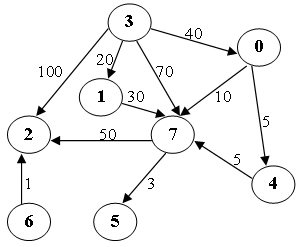6-16 Shortest Path [3](25 分)
2018-02-25 10:53
423 查看
6-16 Shortest Path [3](25 分)
Write a program to not only find the weighted shortest distances, but also count the number of different minimum paths from any vertex to a given source vertex in a digraph. It is guaranteed that all the weights are positive.Format of functions:
void ShortestDist( MGraph Graph, int dist[], int count[], Vertex S );where
MGraphis defined as the following:
typedef struct GNode *PtrToGNode;
struct GNode{
int Nv;
int Ne;
WeightType G[MaxVertexNum][MaxVertexNum];
};
typedef PtrToGNode MGraph;The shortest distance from Vto the source
Sis supposed to be stored in
dist[V]. If
Vcannot be reached from
S, store -1 instead. The number of different minimum paths from
Vto the source
Sis supposed to be stored in
count[V]and
count[S]=1.
Sample program of judge:
#include <stdio.h>
#include <stdlib.h>
typedef enum {false, true} bool;
#define INFINITY 1000000
#define MaxVertexNum 10 /* maximum number of vertices */
typedef int Vertex; /* vertices are numbered from 0 to MaxVertexNum-1 */
typedef int WeightType;
typedef struct GNode *PtrToGNode; struct GNode{ int Nv; int Ne; WeightType G[MaxVertexNum][MaxVertexNum]; }; typedef PtrToGNode MGraph;
MGraph ReadG(); /* details omitted */
void ShortestDist( MGraph Graph, int dist[], int count[], Vertex S );
int main()
{
int dist[MaxVertexNum], count[MaxVertexNum];
Vertex S, V;
MGraph G = ReadG();
scanf("%d", &S);
ShortestDist( G, dist, count, S );
for ( V=0; V<G->Nv; V++ )
printf("%d ", dist[V]);
printf("\n");
for ( V=0; V<G->Nv; V++ )
printf("%d ", count[V]);
printf("\n");
return 0;
}
/* Your function will be put here */
Sample Input (for the graph shown in the figure):

8 11 0 4 5 0 7 10 1 7 30 3 0 40 3 1 20 3 2 100 3 7 70 4 7 5 6 2 1 7 5 3 7 2 50 3
Sample Output:
40 20 100 0 45 53 -1 50 1 1 4 1 1 3 0 3
Vertex FindMin(int dist[], int Sure[], int N)
{
int i = 0, j = 0;
while (Sure[i] == 1 || dist[i] == INFINITY)
i++;
j = i + 1;
while (j < N) {
if (dist[i] > dist[j] && Sure[j] != 1) {
i = j;
return i;
}
else
j++;
}
if (i >= N)
return -1;
else
return i;
}
void ShortestDist(MGraph Graph, int dist[],int count[], Vertex S)
{
Vertex V = S;
int* Sure = (int*)malloc(Graph->Nv * sizeof(int));
memset(Sure, 0, Graph->Nv * sizeof(int));
for (int i = 0; i < MaxVertexNum; i++) {
dist[i] = INFINITY;
count[i] = 0;
}
Sure[V] = 1;
dist[V] = 0;
count[V] = 1;
while (V != -1) {
for (Vertex i = 0; i < Graph->Nv; i++) {
if (Graph->G[V][i] != INFINITY && V != i) {
if (dist[i] != INFINITY) {
if (dist[i] > dist[V] + Graph->G[V][i])
dist[i] = dist[V] + Graph->G[V][i];
else if (dist[i] == dist[V] + Graph->G[V][i])
count[i] = count[i] + count[V];
}
else {
dist[i] = dist[V] + Graph->G[V][i];
count[i] = count[V];
}
}
}
V = FindMin(dist, Sure, Graph->Nv);
if (V != -1)
Sure[V] = 1;
}
for (Vertex i = 0; i <Graph->Nv; i++)
if (dist[i] == INFINITY)
dist[i] = -1;
}
相关文章推荐
- 6-17 Shortest Path [4](25 分)
- [PTA] Week 11 4-16 Shortest Path [3] (25分)
- ZOJ 1760 How Many Shortest Path (网络流.水)
- The shortest path---hdu2224 && Tour---poj2677(旅行商问题)
- 2011-02-28 CLRS Chapter25 All-Pairs Shortest Paths 每对顶点间的最短路径
- 【最短路->DP】SPOJ(ACPC13)[Increasing Shortest Path]题解
- HDU 4725 The Shortest Path in Nya Graph-【SPFA最短路】
- How Many Shortest Path
- 4-1 Shortest Path [3]
- Hdu 2807 The Shortest Path 矩阵相乘
- SPOJ 15. The Shortest Path 堆优化Dijsktra
- 【codeforces#3A】Shortest path of the king
- PAT (Advanced Level) 1126. Eulerian Path (25) 解题报告
- PAT 1126. Eulerian Path (25)
- ZOJ 2760 How Many Shortest Path(Dijistra + ISAP 最大流)
- hduThe shortest path(双调欧几里得旅行商问题)
- OSPF(Open Shortest Path First)开放式最短路径优先协议03
- HDU 4725 The Shortest Path in Nya Graph (最短路)
- hdu-4725-The Shortest Path in Nya Graph-层次网络
- HDU3631:Shortest Path(Floyd)
